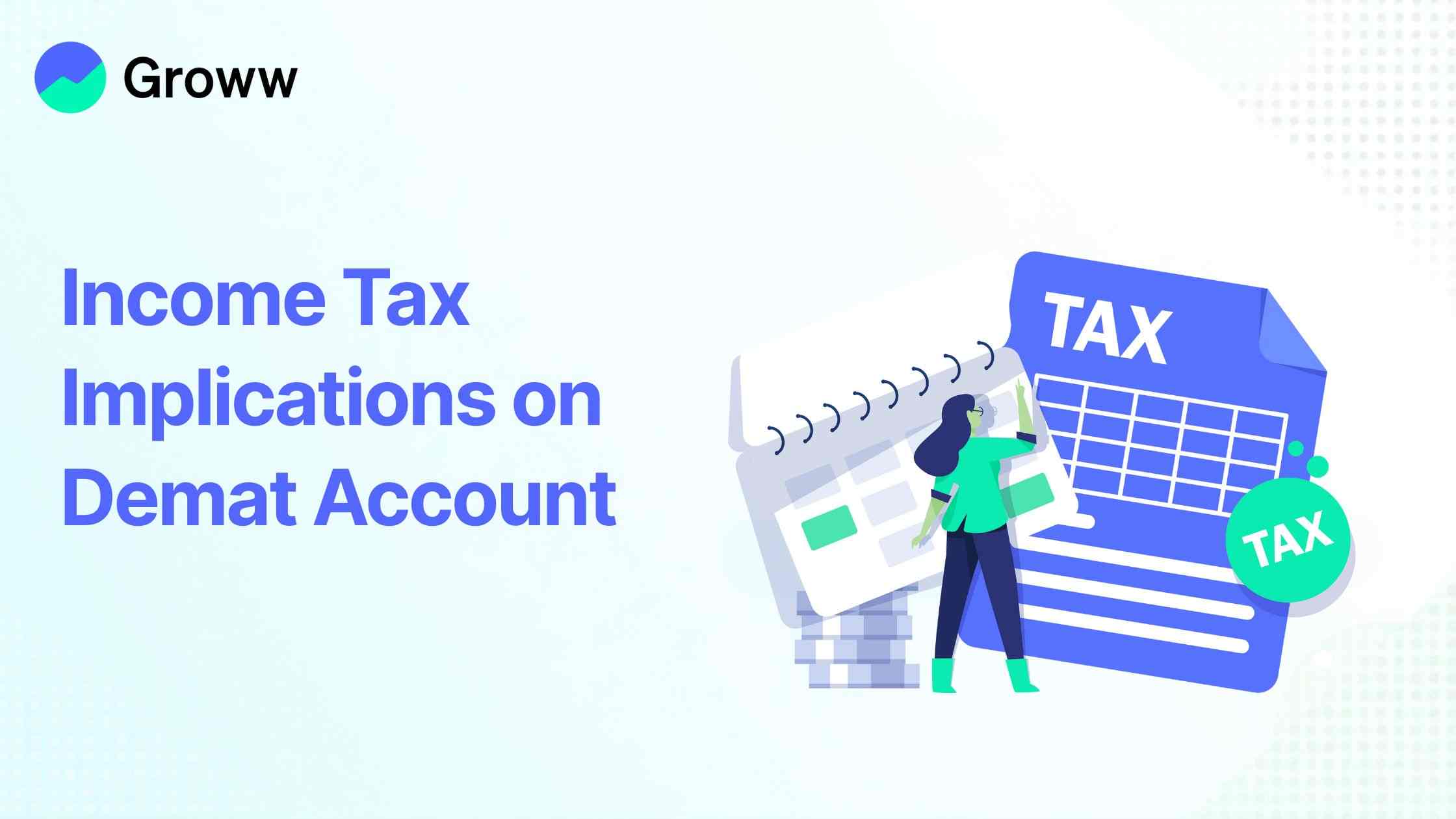Income Tax Implications on Demat Account

Shares and securities can be held and dealt with using a Demat account. Although it makes investing easier, most investors do not pay enough attention to how Demat accounts affect their taxes. Depending on the type of income and your current place of residence, taxes for capital gains and dividends are different.
This guide discusses the income tax implications of demat accounts, including capital gains, dividend income, and how to file.
What is a Demat Account?
A Demat account saves your shares, mutual funds and bonds, as well as other financial securities, in digital format. It takes the role of share certificates and works with your trading account and bank account to help you trade without problems.
Even though you do not pay tax on the account, you may have to pay tax when you earn money from selling shares or receiving dividends.
Types of Income from a Demat Account
Here are the common types of income that a Demat account generates and which are taxable:
- Capital Gains - describe the profits you obtain by selling shares and securities.
- Dividend Income - refers to money provided by companies to those who own their shares.
- Interest income - derived from debt securities or bonds held in a Demat account.
Each category has particular tax implications on a demat account, and these should be mentioned in your tax returns.
Tax on Capital Gains
Capital gains are profits earned from the sale of securities like stocks, ETFs, or mutual funds. These gains are categorised based on the holding period. Here is a guide to capital gains tax on demat accounts.
Short-Term Capital Gains (STCG)
- Applicable when listed equity shares or equity-oriented mutual funds are sold within 12 months of purchase.
- Taxed at a flat 15% under Section 111A of the Income Tax Act.
- No exemption threshold. STCG is taxable even if your total income is below the basic exemption limit (except in special cases for residents).
Long-Term Capital Gains (LTCG)
- Applies if you sell listed equity shares or mutual funds after 12 months of holding.
- LTCG above ₹1 lakh in a financial year is taxed at 10% without indexation.
- The first ₹1 lakh of gains is exempt per Section 112A.
Note: For unlisted shares, different holding periods and tax rates may apply.
Tax on Dividend Income
Earlier, dividend income was tax-free in the hands of investors as the company paid Dividend Distribution Tax (DDT). However, from FY 2020–21, here is the guideline on income from shares taxation:
- All dividend income is taxable in the hands of investors.
- Taxed at your applicable income tax slab rate.
- Companies deduct TDS at 10% on dividends exceeding ₹5,000 per year per company. If PAN is not provided, TDS is 20%.
Ensure that you declare all dividend income, even if no TDS is deducted.
Other Taxes and Charges
Along with income tax on demat account, there are other charges related to Demat and trading activities that you need to know about:
- STT (Securities Transaction Tax): Applied on buying/selling shares on stock exchanges. It is not deductible, but it affects your cost calculation.
- Stamp Duty: Levied on securities transfer, paid during purchase.
- Brokerage and GST: Charges by brokers may include 18% GST.
These are not directly taxed but are important when computing capital gains.
Tax Filing for Demat Account Holders
You must declare income from share taxation in your Income Tax Return (ITR):
- ITR-2: For capital gains/dividends if you don’t have business income.
- ITR-3: If trading is considered your business.
- ITR-1 (Sahaj): Not suitable for capital gains.
Capital gains statement, Demat account summaries, and Form 26AS should be used to accurately report your income and pay taxes.
Income Tax for NRIs on Demat Account
For NRIs holding NRE or NRO Demat accounts:
- STCG on listed equity: Taxed at 15%.
- LTCG: Taxed at 10% if gains exceed ₹1 lakh.
- Dividend income: Subject to TDS at 20%, as per Section 195.
- NRIs must file ITR in India if their total taxable income exceeds ₹2.5 lakh or to claim refunds.
NRIs should also be aware of Double Taxation Avoidance Agreements (DTAA), which may provide relief or lower tax rates on dividends and capital gains.
Tax-Saving Tips for Demat Account Holders
Here are some tips that will serve you well.
- Use Tax Harvesting: Sell shares with LTCG near ₹1 lakh annually to utilise the tax-free limit.
- Set Off Losses: Short-term capital losses can be set off against any capital gains. Long-term capital losses can only be set off against LTCG.
- Carry-Forward Losses: Unused capital losses can be carried forward for eight assessment years if declared in the income tax return (ITR).
- Choose Growth Funds Strategically: Avoiding dividends can lower your taxable income.
- Keep Records: Maintain detailed transaction logs and contract notes for accurate tax filing.
Conclusion
While the demat account itself is not taxable, the income generated through it is. Understanding the capital gains tax on demat accounts, taxation of dividends, and other related charges helps you remain compliant and optimise your tax liability.
Whether you’re a resident or an NRI, timely declaration and proper ITR filing are essential. Use smart strategies like loss harvesting and claim benefits under tax treaties if applicable.
Stay informed, keep track of your transactions, and consult a tax advisor if needed.